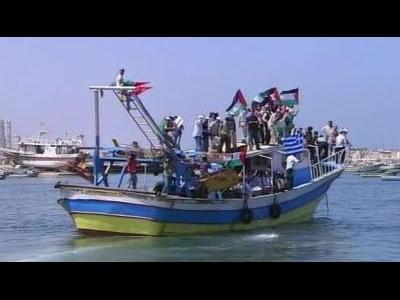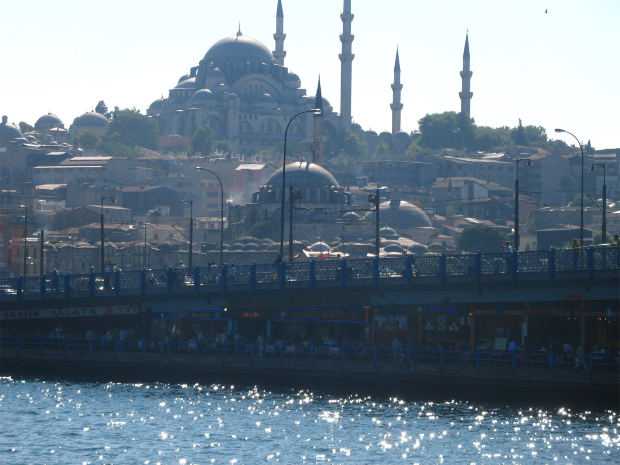By SABRINA TAVERNISE
Published: May 31, 2010
ISTANBUL — The Israeli commando raid on Monday on an aid flotilla, which left at least nine people dead, has dragged relations between Israel and Turkey to a new low, political experts here say, threatening to derail diplomatic relations between two close American allies.
Enlarge This Image

Fred Chartrand/The Canadian Press, via Associated Press
Prime Minister Benjamin Netanyahu on Monday cut short a trip to Canada after the Israeli raid on a Gaza-bound aid flotilla.
Related
-
Israeli Raid Complicates U.S. Ties and Push for Peace (June 1, 2010)
-
Deadly Israeli Raid Draws Condemnation (June 1, 2010)
-
Security Council Debates Criticism of Israeli Raid (June 1, 2010)
Enlarge This Image

Cristobal Sanhueza/Associated Press
The raid prompted a strong official reaction from Turkey, with Prime Minister Recep Tayyip Erdogan interrupting a trip to Chile.
Turkey, a NATO member, has long been Israel’s closest friend in the Muslim world, with $2.5 billion in trade in 2009 and strong ties between the countries’ militaries and governments. But relations began to deteriorate during Israel’s war in Gaza, when Turkey’s prime minister, Recep Tayyip Erdogan, publicly sparred with Israel’s president, Shimon Peres, at the World Economic Forum in Davos, Switzerland.
Monday’s raid on the Gaza-bound aid flotilla, which was sponsored in part by a Turkish organization, prompted street protests in Turkey and a strong official reaction, with Ankara recalling its ambassador from Israel, summoning Israel’s ambassador and canceling planned joint military exercises. That was enough to raise alarms among analysts here, who said it could seriously jeopardize already battered diplomatic relations between the countries.
“This will be perceived as a kind of declaration of war on Turkey,” said Cengiz Candar, a columnist for Radikal, a Turkish daily. “Political dialogue will cease. It’s not possible to contain the deterioration in relations anymore.”
But it was not yet clear how broad the implications would be. As of Monday evening, Israel’s ambassador to Turkey had not been asked to leave the country, and Turkey’s foreign minister spoke by phone to Israel’s defense minister — evidence that, at least at some level, diplomatic channels remained open. The leaders of the two countries’ militaries also spoke by telephone, the Turkish military said.
A senior Turkish official, speaking on the condition of anonymity because he was not authorized to speak publicly on the matter, said it was possible that Turkey would cut off diplomatic relations, but that such a move would depend on Israel’s next steps. Turkey expects the immediate release of the activists on board the ships, the official said, as well as a strong apology from the Israeli government. Neither has been forthcoming, and there were reports late Monday that Israel had arrested some people from the ship.
A senior Israeli official said that Israel had tried for two weeks to persuade Turkey to stop the flotilla’s voyage, but that Turkey said it was a nongovernmental action that it was powerless to stop. Israel’s ambassador in Turkey, Gabi Levy, did not return a call for comment.
One wild card is Mr. Erdogan, a strong-willed former Islamist who is the driving force behind Turkey’s criticism of Israel and its policy toward the Palestinians. He has pushed a foreign policy that has taken a more active role in the region, serving as mediator between Israel and Syria. But the United States has not appreciated all his efforts, like his recent attempt with Brazil to broker a nuclear deal with Iran.
In a news conference in Santiago, Chile, where he cut short a trip to return to Turkey, he called the raid “inhumane state terrorism,” and said that Israel’s contentions that there had been weapons on the ships were “lies.”
“This attack has clearly shown that the Israeli government has no desire for peace in the region,” he said in remarks that were broadcast on Turkish television. But he also called for calm, saying that Jews in Turkey “are our citizens,” and adding that “I want my people to be very sensitive about this.”
The situation is difficult for the United States, which has close relations with both countries and is now in the awkward position of devising a reaction that avoids alienating either side. Both the United States and Israel use Turkish airspace for military exercises. The United States transports the majority of supplies for Iraq from a military base in southern Turkey.
Asli Aydintasbas, a columnist at the Turkish daily Milliyet, argues that the episode was a striking failure in diplomacy, for both the United States and Turkey. The new foreign policy pursued by Turkey’s government has given it a confidence that sometimes results in overreaching. For example, Turkey believed it could change Israeli policies toward Gaza.
“This was a disaster waiting to happen,” Ms. Aydintasbas said. “Both Turkish and American officials could have stopped the boats from moving forward. It’s clear they didn’t try hard enough.”
Mr. Erdogan is seen favorably by many in Turkey’s small Jewish community. He encouraged the relationship with Israel, visiting in 2005 with a group of Turkish businessmen. He was the first Turkish prime minister to visit the office of Turkey’s chief rabbi, after a synagogue was bombed in 2003.
But when it comes to Hamas, which controls Gaza, they disagree. Israel views Hamas as a terrorist group and focuses on its doctrinal commitment to destroy the Zionist state. Mr. Erdogan sees other aspects: Hamas began as a grass-roots Islamic movement, and like his own Justice and Development Party, also Islamic-inspired, it was democratically elected against overwhelming odds.
One Turkish tactic will be to try to garner international condemnation in order to change Israeli policies toward Gaza, namely its blockade, Turkish analysts said. Turkey’s foreign minister, Ahmet Davutoglu, flew to New York to spearhead Turkey’s efforts to call for a vote on the matter in the United Nations. Turkey became a member of the Security Council last year.
Mr. Candar, the columnist, views the future of relations grimly. The raid provoked outrage among the Turkish public — in Istanbul, crowds thronged Taksim Square and tried to storm the Israeli Consulate — sentiment that Mr. Erdogan could capitalize on in national elections next year.
The current governments in Israel and Turkey seem stuck in a cycle of hostility, and Mr. Candar does not see that changing. “As long as this government is in power and the one in Israel is in power,” he said, “it will be a hostile relationship, not even a neutral one.”
Sebnem Arsu contributed reporting from Istanbul, and Ethan Bronner from Washington.







 Play Video
Play Video  Play Video
Play Video 
